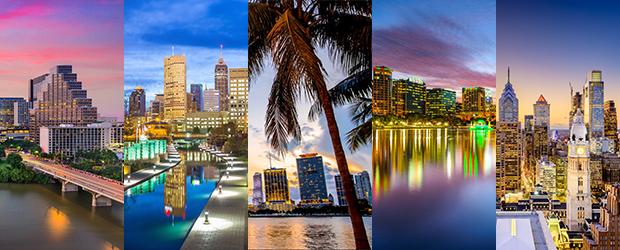Smart Cities Council, a smart cities network, announced Austin, Indianapolis, Miami, Orlando and Philadelphia as this year’s winners of the Smart Cities Council Readiness Challenge Grant program. Over 130 cities participated in the application process. The winning cities will use the grant to develop a roadmap for applying smart technologies to promote innovation, inclusion and investment within their cities.
“Breaking down the departmental silos is a key challenge in developing a smarter city. Each of the winning cities has demonstrated the ability to work across departments to solve problems,” said Smart Cities Council Chairman Jesse Berst in a press release. “Our coalition of world-class experts looks forward to working with each of these enterprising cities to help them make smart use of technology to become more livable, workable, sustainable and resilient.”
Austin plans to design strategies and solutions for affordable housing for underserved populations, mobility and economic development issues that have been heightened by Austin’s rapid growth, booming tech sector and attractive quality of life. The city is concentrating its efforts on reaching people rarely take part in traditional forms of civic engagement.
Indianapolis and Marion County will strengthen emerging initiatives in smart utilities and transportation. Indianapolis formed a working group of ecosystem partners to assess smart city capabilities and integrate with the city’s future planning. Marion County recently approved development of the first electric bus rapid transit (e-BRT) system in the country and is also moving forward with 16 Tech – a comprehensive IoT hub that will pioneer citywide digital infrastructure.
Miami will demonstrate the value of smart technologies to enhance urban resilience. As a coastal city with strong geographical growth constraints, Miami is already experiencing the effects of climate change, including frequent tidal floods. The city is planning a Sea-Level Rise Pilot Program that will use geographic information system data across departments along with 3-D modeling, waterfront sensors and LIDAR to provide real-time alerts and inform planning efforts.
Orlando and Orange County will receive help to develop a comprehensive smart city plan that fully integrates multiple city departments and regional stakeholders. As a global tourist destination, Orlando hopes to showcase a range of smart transportation solutions that can enhance the visitor experience while improving safety and reducing congestion. The city is also working to integrate sensors and advanced communications systems into its public safety programs.
Philadelphia will get help facilitating collaboration and building a regional smart cities ecosystem. The process of applying for the grant has already helped to bring city departments together, causing them to realize they were working on individual solutions to common problems.
The Smart Cities Council has regional councils in North America, Europe, India and Australia/New Zealand, and is comprised of more than 120 partners and advisors who generate $2.7 trillion in annual revenue and who have worked on more than 10,000 smart city projects past and present.


